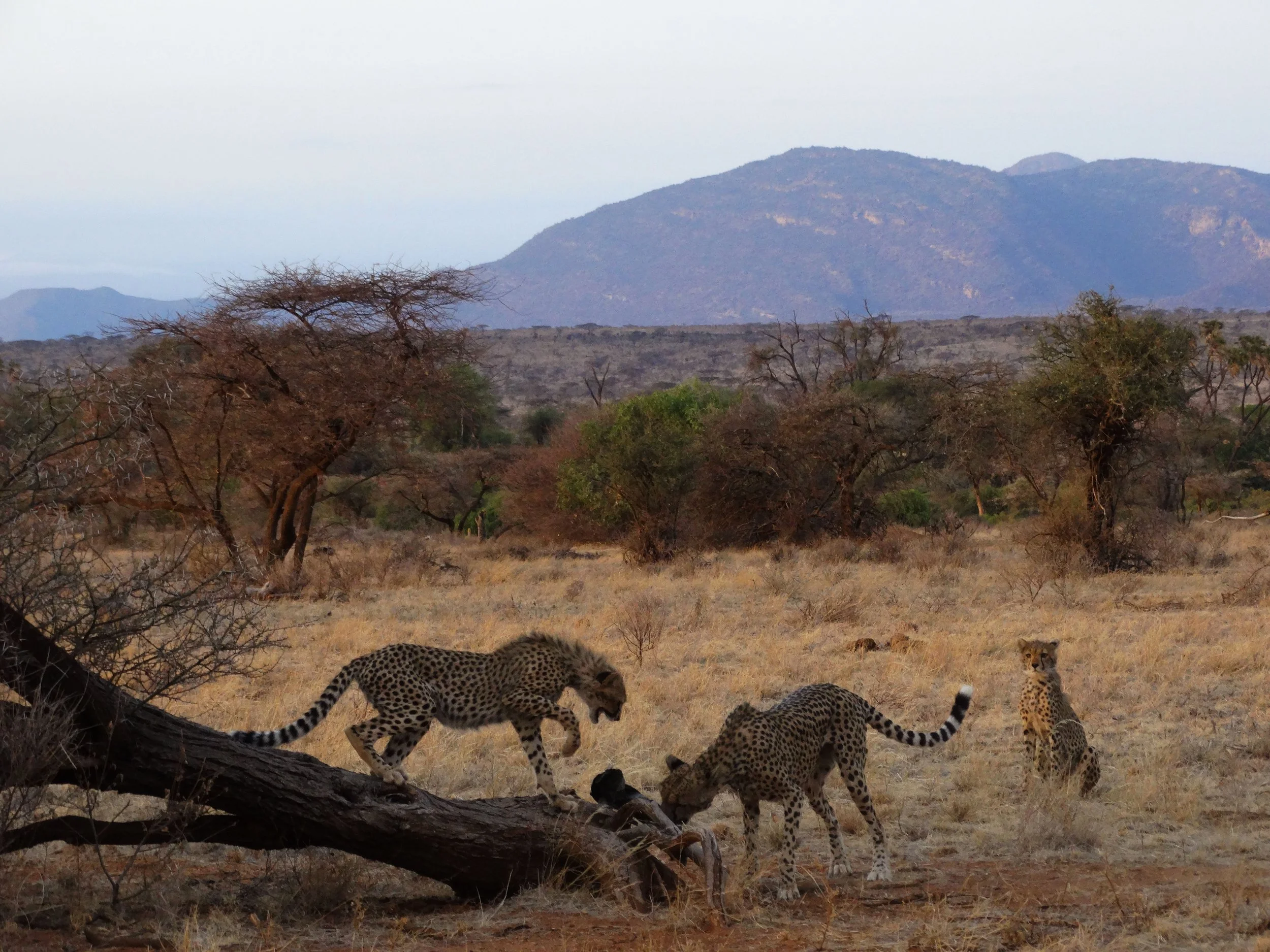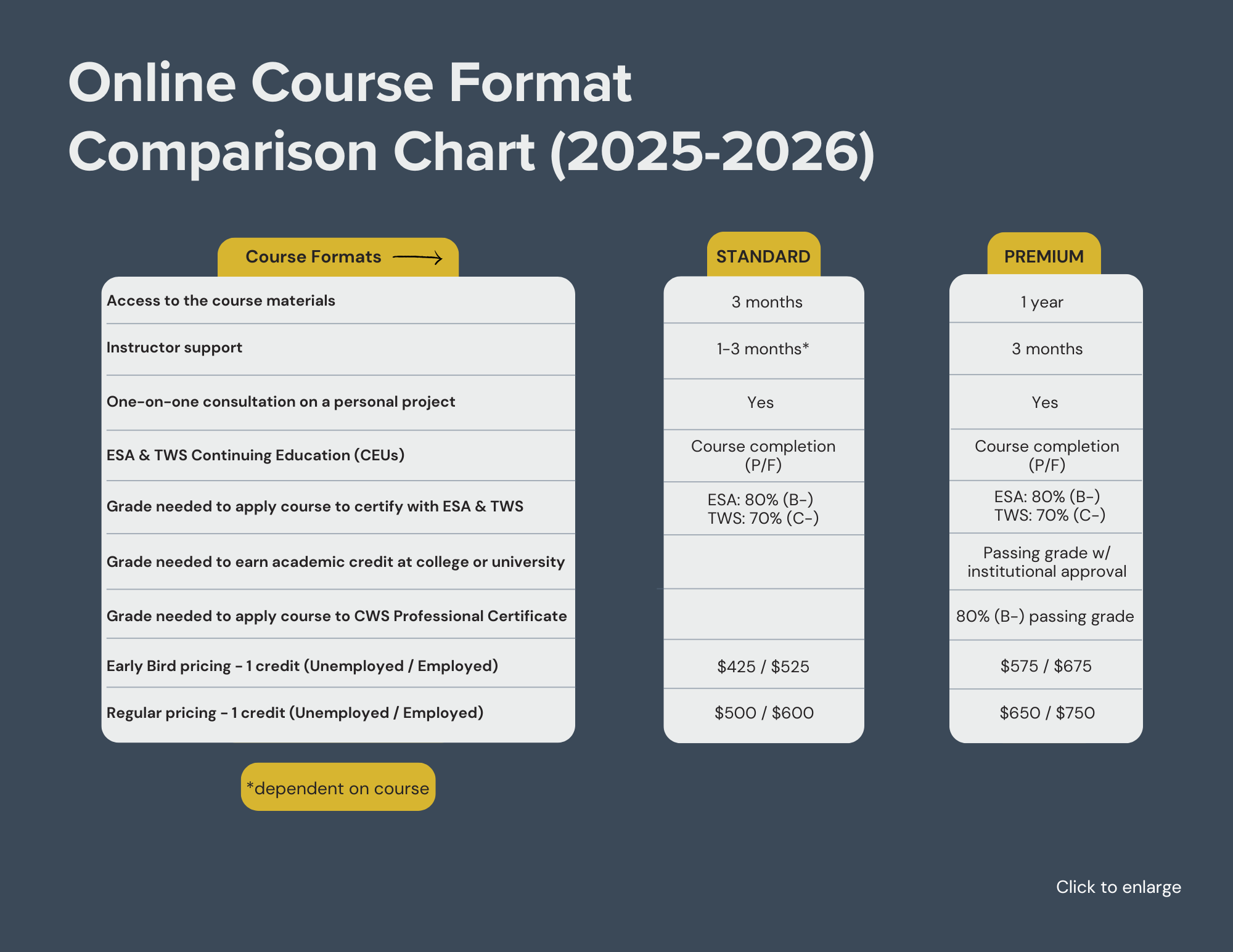-
In a world increasingly shaped by human activity—through habitat destruction, urbanization, and climate change—wildlife faces unprecedented challenges. Understanding how animals are impacted by these pressures requires a solid grasp of their behavior. Moreover, as some species respond and adapt, new behaviors can lead to escalating human-wildlife conflicts. By studying animal behavior, scientists and conservationists can design strategies that minimize harm and foster coexistence.
In this course, learners will develop practical skills in applying foundational principles of animal behavior to real-world conservation challenges. Learn to design experiments for studying animal behavior in both captive and wild environments, and collect and analyze behavioral data using observational techniques including ethograms, camera traps, and bioacoustics. Develop and assess conservation action plans that integrate behavioral data, while also accounting for the human behavioral dimension by identifying and assessing relevant stakeholders.
Lastly, examine real data and case studies to explore how behavioral insights inform solutions to pressing issues such as conflict mitigation, habitat restoration, and resource management. For instance, we’ll ask:
How can understanding habitat use and movement for a growing population of Florida Panthers be used to design suitable ranges while minimizing human-wildlife interactions?
Can we reduce threats and increase habitats for native bees in urban green spaces while accounting for various stakeholder perspectives?
How can we use underwater video data of reefs to assess the efficacy of traditional Fijian fisheries management?
-
Summer: June 1 - August 23, 2026 (Early bird* ends May 3)
*Early bird saves $75
-
Basic understanding of animal behavior; introductory statistics and a basic understanding of R and Python would be useful but not necessary.
-
Module 1: Introduction to Animal Behavior and Conservation
Objective: To learn about: the history of approaches to animal behavior study; proximate and ultimate causes of behavior; fundamental concepts in animal movement, migration, and social and reproductive behavior; and how these fundamental concepts can be applied in various contexts for conservation purposes
Lecture 1: Intro/class overview, history of animal behavior
Lecture 2: Defining behavior
Lecture 3: Foundational principles of behavior
Lecture 4: Applications of behavior to conservation practice
Outcomes:
Compare and contrast questions and experiments conducted at multiple levels of analysis to generate a deeper understanding of behavior
Explain how animals balance behavioral decisions to: obtain food and avoid predators; select habitats and defend territories; join groups and mitigate reproductive conflict
Assess the use of behavioral data to captive animal management, care, and welfare assessments, as well as wild conservation practices such as translocations and reintroduction programs
Apply behavioral data to societal issues such as the mitigation of human-wildlife conflict and improvement of alternative energy solutions
Module 2: Research Methods in Animal Behavior
Objective: To develop skills in experimental design, behavioral data collection, and data analysis required for the study of animal behavior in wild, captive, and laboratory environments.
Lecture 5: Designing a behavioral study
Lecture 6: Traditional Ethograms
Lecture 7: Computational Ethology
Lecture 8: Camera trapping
Lecture 9: Bioacoustics
Lecture 10: Applied demography
Outcomes:
Compare and contrast methods for designing experiments to answer behavioral questions in different contexts
Explain issues of sample size, low repeatability, reliability, within-individual variation, and non-parametric statistics in evaluating behavioral data
Collect, categorize, and evaluate animal behavior using an ethogram
Classify animal behavior using computation ethology programs such as DeepLabCut, VAME, and Anipose
Assess potential applications for using camera traps to collect behavioral data
Analyze camera trap data in R to answer questions about temporal niche partitioning
Analyze acoustic data to answer ecological and behavioral questions about urban bats
Analyze demographic data to resolve a conflict between parrot conservation and palm tree harvest
Module 3: Considering Stakeholders
Objective: To understand the importance of identifying and comparing various perspectives of different stakeholders when developing conservation strategies.
Lecture 11: Assessing and mapping stakeholders
Lecture 12: Case studies: Florida Panthers, Urban Bees, Fisheries Management
Lecture 13: Developing conservation action plans
Outcomes:
Conduct a stakeholder analysis to identify relevant stakeholders and assess their views and interests on a proposed conservation project
Compare and contrast different potential perspectives of local and nonlocal stakeholders in real-life conservation scenarios
Evaluate the importance of acknowledging and incorporating stakeholder perspectives in conservation management
Interpret conservation action plans and explain how behavioral data can be used to develop focused strategies and measures of success
COURSE OPTIONS & INFORMATION (Review chart above, then click below)
-
FORMAT:
3 months of access to course materials as you work at your own pace
Get instructor support for the 3-month term via email, discussion threads, group meetings, and one-on-one appointments
After working through the course materials, set up an optional meeting with the instructor to discuss your own personal project from work or school
CONTINUING EDUCATION:
16 CEUs with The Wildlife Society
CERTIFICATIONS:
Earn 1 credit toward certification as an Associate/Certified Wildlife Biologist® (at any level) with The Wildlife Society
-
FORMAT:
12 months of access to course materials as you work at your own pace
Get instructor support for the 3-month term via email, discussion threads, group meetings, and one-on-one appointments
After working through the course materials, set up an optional meeting with the instructor to discuss your own personal project from work or school
CONTINUING EDUCATION:
16 CEUs with The Wildlife Society
Go to our Continuing Education Page for more details
CERTIFICATIONS:
Earn 1 credit towards a professional certificate in Conservation Planning with CWS
Earn 1 credit toward certification as an Associate/Certified Wildlife Biologist® (at any level) with The Wildlife Society
ACADEMIC CREDIT:
Earn 1 academic credit (go to our Academic Credit Page for details)
Earn an additional 1-2 academic credits with an Applied Project
INSTRUCTOR
SCHOLARSHIPS
Full scholarships are available to participants from countries designated as “lower income” and “lower middle income” in the World Bank List of Economies. Please see our CWS World Scholars Program page for details.
CANCELLATION POLICY
Cancellations 30 days or more before the start date are not subject to cancellation fees. Cancellations <30 days before the start date are subject to a 50% cancellation fee. No refunds once the course begins.




